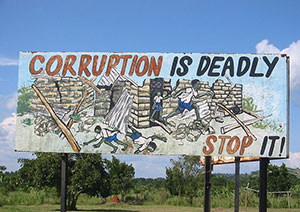16 May 2013, by Akaash Maharaj.

Credit: flickr / futureatlas.com
We live in an age of dire cynicism about corruption in politics. Of the 100 nations surveyed for Transparency International’s most recent Global Corruption Barometer, only in 5 did a majority believe that the country was becoming less corrupt, and there was no country whatsoever whose population ranked their political parties or parliament as being “not at all corrupt”.
Globally, the consequences of political corruption almost defy understanding.
The World Bank estimates that more than $1 trillion are paid in bribes every year, the largest of which are to obtain state contracts and monopolies. The UN Office on Drugs and Crime estimates that multinational criminality moves $2.1 trillion per year across borders, enabled by the active collusion or passive inattention of regulators. The Tax Justice Network estimates that governments lose $3.1 trillion per year because of tax evasion, disproportionately by those with the resources to sway policy makers or public servants.
By comparison, meeting the much-vaunted Millennium Development Goals – eradicating extreme hunger and poverty, establishing universal primary education, reducing child mortality by two‑thirds, reducing maternal mortality by three-quarters, halting the spread of HIV and malaria, halving the proportion of people without access to clean water and sanitation, and promoting gender equality in schools and the workforce – would cost no more than $481 billion in development.
What the world loses to corruption in a single year would be enough to end the worst forms of human misery and transform human civilisation, at least a dozen times over.
Political corruption robs citizens of our own resources, our fundamental rights, and our very identities as members of a free and equal society. It makes the weak prey to the strong, and delivers control of society into the hands of the unjust. It debilitates the nation, undermines the rule of law, and rots public confidence in democracy. It is a crime against hope itself.
Corruption takes many forms: the theft of public resources; the sale of political influence; the betrayal of the public trust. In all cases, however, corruption thrives when political power is able to operate in the shadows, and it withers before the glare of public scrutiny.
The solution to corruption is therefore extraordinarily simple to describe, though fiendishly difficult to achieve: a vigilant, relentless, and fearless community of citizens and parliamentarians, standing together between our leaders and the levers of power.
Parliamentarians are the watchdogs of democracy, and it is tragic that so many citizens of so many nations perceive our watchdogs as having muted their bark, muzzled their bite, and been neutered by the very powers they were meant to hold at bay.
NGOs and grassroots movements are the most directly accessible outlets for the popular will, and it is just as tragic that so many parliamentarians of so many nations perceive them as unaccountable forces that threaten to trample representative democracy in their haste to sweep away corruption.
The Global Organization of Parliamentarians Against Corruption (GOPAC) has recently launched a new Global Task Force on the Participation of Society, to bridge the gap between parliamentarians and NGOs. Chaired by Ms Fernanda Borges, a former parliamentarian from East Timor and one of GOPAC’s most respected members, this Global Task Force will work to forge collaborations and mutual support between both groups, for the greater good of the public both groups exist to serve.
Ultimately, the success of this Global Task Force will lie in its potential to inspire cynical citizens to believe that the political process can be part of the solution, not only part of the problem; to stir courage in legislators to stare down those who know no restraint; and to convince both groups that together, we can achieve the victory over corruption that none of us can reach alone.
About Akaash Maharaj
Akaash Maharaj is Executive Director of the Global Organization of Parliamentarians Against Corruption (GOPAC).



